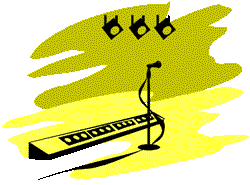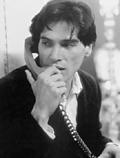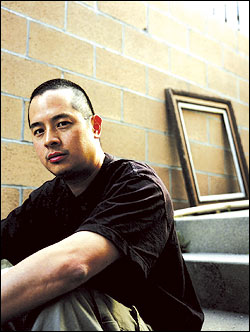Persona is a trap like any other, and stepping away from your earlier self as you get older can be difficult for anyone. For pop musicians, though, persona may be even more doggedly pernicious. Imagine being 40 years old and continually asked by complete strangers why you don’t have the same friends or interests you did at 30 or 20. A successful band can do that to you, and so can a particular outlook you’ve long since shed.
It’s not quite accurate to say there’s no connection between the Bob Mould of the past few years and the one that sparked two great guitar trios, ’80s post-hardcore heroes Hüsker Dü and mid-’90s alt-rock favorites Sugar. Even a cursory listen to Body of Song, Mould’s sixth overall solo album, which Yep Roc released last June, demonstrates that his taste for thickly layered guitar and vocals hasn’t changed exceptionally from his work with those two bands. But Body of Song is not only the most buoyant album he’s made since Sugar’s 1992 Copper Blue and 1994 File Under: Easy Listening, it’s the most blatantly optimistic of his career. It’s also an extension of 2002’s Modulate, on which Mould experimented boldly, and erratically, with electronic dance music; on Body tracks like “(Shine Your) Light Love Hope” and “I Am Vision, I Am Sound,” Mould sounds as fully comfortable utilizing beats, vocoders, and sonar blips as he does gouging out a lengthy solo on the concluding track, “Beating Heart the Prize.”
I spoke with Mould while he was running errands in his hometown of Washington, D.C., shortly after he returned from the first, European leg of his current solo acoustic tour, which he brings to Neumo’s this week.
Seattle Weekly: Last summer, I was in Minneapolis and saw you DJ at the gay bar the Eagle with Richard Morel during Pride weekend. Given that you lived in Minneapolis for a long time, while you were in Hüsker Dü, was it weird to go back and DJ as opposed to playing live?
Bob Mould: Sure. It was strange. It was very different. What you saw was the Blowoff project, the other thing I’m going to be spending most of this year on besides the acoustic dates. It’s a monthly party that Richard Morel and I do here in D.C. The one thing that was missing from the event you saw was the live thing that we do when we DJ here. But it was sort of strange to go back for Pride weekend and DJ in the basement of the Eagle. A little different than playing a punk-rock show in the 7th Street Entry—but really not that different, if you really think about it.
When you started doing Blowoff, did you find the crowd appreciably different from a usual rock-show crowd seeing Bob Mould or Sugar? Or was it more like a regular club crowd?
It was more of a gay-guys-in-their-30s-and-40s crowd. There’s always a few that show up at every Blowoff who go, “I’m such a fan of your other stuff, your not-DJ stuff.” I think it’s just all part of being me at the end of the day, I guess. The more that I try to segregate things, the more it gets confusing for everybody, so I just sort of look at it as all of the different things I’m doing right now.
One thing I’m impressed by about Body of Song is how integrated its various components are—the dance stuff is mixed into the rock stuff in a way that flows.
Thanks. Modulate was sort of a shock to people because there was so much electronic stuff in there. I think now I’m a little more comfortable with how to mix them all together—a little more comfortable technically. So yeah, this record’s a big step forward. It’s a real nice amalgamation of all those things. I think in the last three years, the whole climate of music has changed so much, as far as the indie kids being a little more accepting of the dance beat. Everything’s come to a sort of different place now.
Did you ever feel like having an older audience that’s been following you for a long time might be a bigger mountain to climb, as far as getting them to accept your doing dancier stuff?
Well, they’re just not used to it, so anything that deviates far from what [they’ve heard] for 20 years, I thought, would be a bit of a challenge. Some people got it; some people had a hard time with it. I really don’t think about that stuff very much. I think about doing music every day, and hope that people like the end result. All that other stuff is way too confusing for me.
There’s a sonic density about all the stuff on Body of Song, whether it’s dance or rock oriented. Was that deliberate?
When I first heard Xpander by [trance producer-DJ] Sasha, I went, “Wow, this is like [Sugar’s 1992 EP] Beaster, but with machines.” [laughs] But whether it’s guitars or machines, I tend to try to pile it on. I’ve always been curious about the sounds between the sounds; that’s where all the happy accidents happen.
You’ve been doing some remixes. Do people call you to do them? I know you’ve done some on your own for Blowoff.
Yeah, bootleg stuff. The ones I’ve been called on have been VHS or Beta, Low, Interpol, and I just finished a Rammstein remix a couple weeks ago, right before I left for Europe. The Low and Interpol mixes have done real well. This Rammstein one, we’ll see. It’s very cinematic; it’s not as housey as the stuff I usually do—it’s a little more Blade Runner.
Before this acoustic tour, when you were out with a full band, you were playing from all aspects of your career, from Hüsker Dü to now.
I’ve always done that with the acoustic show. The band shows last year [were] the first time I went through the whole songbook.
Doing it with a band, was there ever a point where you felt weirded out to be playing your older stuff?
Nope, and I wish I’d thought about it that way sooner. [laughs] The only thing I was thinking about was, “Wow, this band is really fun! And these songs are really good.”
Bob Mould plays Neumo’s with Rocky Votolato at 8 p.m. Wed., Feb. 15. $13 adv./$15.








